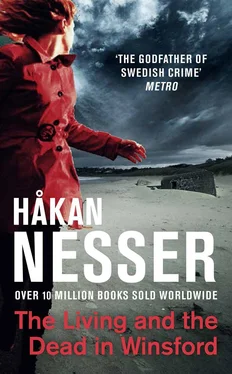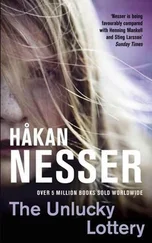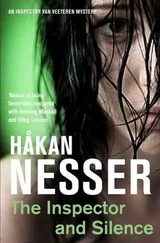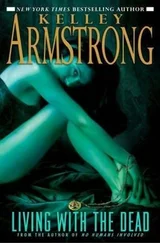Håkan Nesser - The Living and the Dead in Winsford
Здесь есть возможность читать онлайн «Håkan Nesser - The Living and the Dead in Winsford» весь текст электронной книги совершенно бесплатно (целиком полную версию без сокращений). В некоторых случаях можно слушать аудио, скачать через торрент в формате fb2 и присутствует краткое содержание. Год выпуска: 2013, Издательство: Mantle, Жанр: Криминальный детектив, на английском языке. Описание произведения, (предисловие) а так же отзывы посетителей доступны на портале библиотеки ЛибКат.
- Название:The Living and the Dead in Winsford
- Автор:
- Издательство:Mantle
- Жанр:
- Год:2013
- ISBN:нет данных
- Рейтинг книги:4 / 5. Голосов: 1
-
Избранное:Добавить в избранное
- Отзывы:
-
Ваша оценка:
- 80
- 1
- 2
- 3
- 4
- 5
The Living and the Dead in Winsford: краткое содержание, описание и аннотация
Предлагаем к чтению аннотацию, описание, краткое содержание или предисловие (зависит от того, что написал сам автор книги «The Living and the Dead in Winsford»). Если вы не нашли необходимую информацию о книге — напишите в комментариях, мы постараемся отыскать её.
The Living and the Dead in Winsford — читать онлайн бесплатно полную книгу (весь текст) целиком
Ниже представлен текст книги, разбитый по страницам. Система сохранения места последней прочитанной страницы, позволяет с удобством читать онлайн бесплатно книгу «The Living and the Dead in Winsford», без необходимости каждый раз заново искать на чём Вы остановились. Поставьте закладку, и сможете в любой момент перейти на страницу, на которой закончили чтение.
Интервал:
Закладка:
I received help of various kinds, and was eventually allocated a therapist. It was the first time in my life I had met one; her name was Gudrun Ewerts, and after only two or three sessions she expressed the opinion that I ought to have been given help much sooner. When I told her the story of my life up to that point — it was 1983, and I had just celebrated my twenty-sixth birthday — Gudrun put her head in her hands and sighed.
‘My dear,’ she said. ‘Have you paused to think about what you’ve been through these last ten years?’
I thought about that, then asked her what she meant.
She glanced at her notebook. ‘If I understand things correctly, what’s happened is as follows: your younger sister has died. Your boyfriend has died. Your mother and father have died, and you have given birth to two children. Is that right?’
I thought once again. ‘Yes,’ I said. ‘That’s right. I suppose it’s a bit much.’
Gudrun smiled. ‘You can say that again. And I don’t blame you for reacting as you have done.’
She went on to explain that what I had done was simply to bottle everything up, and that was what was now punishing me. She accepted that bottling things up could be an effective way of dealing with such happenings: but before you do that you need to have a clear idea about what it is that is being hidden away.
She liked to express herself in images, and what we spoke about in all our conversations — for there were many, definitely over a hundred — had much more to do with the fatal accident to my younger sister and the tragic fall that killed my boyfriend than with little Synn.
But it was mainly to do with me, of course.
My life had been badly mismanaged, I was informed. I hadn’t dealt with it as one ought to deal with one’s life, I hadn’t taken it seriously enough. But I was pretty well suited to be a television performer, she was the first to acknowledge that, and I recall that we laughed about it. On the whole it would be an advantage if the television authorities could use cartoon versions of newsreaders, Gudrun thought: it is not good for anybody to sit staring at a camera, knowing that a million anonymous viewers are sitting on their sofas and gaping at your face. Evening after evening. I actually passed on her suggestion to one of my bosses, but as expected it fell on stony ground.
We continued to meet regularly even after my depression had died down and dispersed. The meetings covered getting on for two-and-a-half years, reducing eventually to just once or twice a month towards the end; and I know that nobody has contributed more to my understanding of myself than this Gudrun Ewerts.
‘You have been living all your life on other people’s terms,’ she said. ‘Since your little sister’s death, at least. You have been living a mirror image of yourself — do you understand what I’m saying? If you bury your own free will in a desert, you can’t expect it to survive.’
I know that she came into my mind as I was walking along the windy beach at Miȩdzyzdroje, that dear old therapist of mine; when I was walking in a sort of dream after having closed that heavy door. Maybe it’s not all that surprising, and I have the impression that I smiled at her. Or at least, at her memory: she has been dead for more than ten years, and it must have been a strange sort of smile.
*
But the relationship between me and my daughter never improved. She became an introverted child, learned to occupy herself far too soon, and the contact between us was always inadequate. It was as if we were playing the roles of mother and daughter, and without a doubt we were skilful actresses, both of us. Unfortunately the same sort of relationship applied to father and daughter — perhaps even more so. Throughout the whole of her childhood Synn was in charge of her own life: she looked after her school work and her relationships with her friends in exemplary fashion — or at least without any interference from us — and she kept her secrets to herself. I have no idea when she started her periods, nor when she lost her virginity. Two weeks after taking her school-leaving exam she moved to France, and I remember thinking that I had been a sort of hotel-keeper rather than a mother. I’d had a guest in the same room for nineteen years, and now she had moved on.
I never discussed this with Martin — there wouldn’t have been any point. The other hotel guest, Gunvald, had moved out only six months before his sister.
When I write about this it feels as if it isn’t true. It can’t have been as bad as that, I’m sitting here and making it all up. I lay awake night after night, worrying about it — surely that was the case? I thought about them and was convinced that I loved them.
Ah well, there are some people who believe that telling lies is the only way of getting close to a sort of truth.
*
We arrived at the hotel in Kristianstad at about seven o’clock. It was a grey morning, foggy. I had slept in the car for a few hours, but Martin was so tired that he couldn’t see straight. He drank three cups of coffee, and after our substantial breakfast and a shortish walk with Castor we continued to Ystad, where we drove onto a ferry to Świnoujście shortly before lunch.
The crossing took six hours. Martin slept more or less all the time; I sat in a deckchair beside him and tried to solve the crossword puzzle in the Svenska Dagbladet , as it was a Friday and I had managed to buy the newspaper in a kiosk on the way to the harbour. Castor lay stretched out at our feet. I recall that there were not many passengers, and I was soon overcome by a strong feeling of being abandoned. Almost a loss of identity. Who was I? Where was I going? Why?
Those are not useful questions for a fifty-five-year-old woman to ask herself, especially in circumstances in which there is no chance of finding an answer. After a while I realized that the best way of imposing a check on my increasing angst would be to ring Christa and exchange a few words with her: but by the time this insight dawned on me we were already so far out to sea that there was no mobile signal.
Instead I started thinking about a speech Martin had once given, in which he declared that there was no great difference between the concepts of ‘potato’ and ‘angst’. There were characteristics that could be ascribed to angst, and characteristics that could be ascribed to potato: some were the same, others were different. And that was that. It was in connection with a dinner to celebrate the awarding of a doctorate to one of his colleagues, a dry-as-dust lecturer in semantics. I recall that the comparison gave rise to much amusement around the table, and that Martin was immensely proud of his ingenuity. Without acknowledging it with so much as a smile, of course. Personally, I had no idea what he was talking about.
We met at the Monkeyhouse a hundred years ago, Christa and I. We worked under the same roof — and as often as not within the same cramped walls — for several years before we got to know each other. Our friendship began at the end of the nineties when she divorced her husband, a not exactly unknown actor with an enormous ego. Christa was far from well, and indeed felt so bad that some days when she came to work she needed to take two sleeping tablets and then go and hide away in order to avoid a complete breakdown.
She used to say: ‘Maria, I’m on the edge of complete breakdown — please sit by me and hold my hand until I fall asleep.’
And I would sit there, in one of the Monkeyhouse’s small rest rooms, holding one of her hands in both of mine while she wept, spoke, started slurring her words and eventually fell asleep. That would happen several times a week for at least three months, and how on earth we managed to conceal the situation from our bosses is still a mystery.
Читать дальшеИнтервал:
Закладка:
Похожие книги на «The Living and the Dead in Winsford»
Представляем Вашему вниманию похожие книги на «The Living and the Dead in Winsford» списком для выбора. Мы отобрали схожую по названию и смыслу литературу в надежде предоставить читателям больше вариантов отыскать новые, интересные, ещё непрочитанные произведения.
Обсуждение, отзывы о книге «The Living and the Dead in Winsford» и просто собственные мнения читателей. Оставьте ваши комментарии, напишите, что Вы думаете о произведении, его смысле или главных героях. Укажите что конкретно понравилось, а что нет, и почему Вы так считаете.












